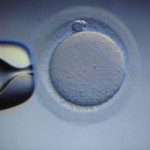
 Egg with surrounding cumulus cells
Egg with surrounding cumulus cells
There is an old IVF joke that goes: “How do you like your eggs, scrambled or fertilized?” While it is funny, it also has a bit of truth. Every patient undergoing IVF wants their eggs fertilized, but what happens if the eggs are “scrambled” instead?

One of the most common causes of a woman’s infertility is poor egg quality. Egg quality refers to the ability of the eggs to fertilize and develop into viable embryos. In order to be fertilized, the egg needs to have the proper number of chromosomes. Some eggs in your body are, in fact “scrambled”, and do not contain the correct number of chromosomes, making a viable pregnancy highly unlikely.

One of the most important indicators of egg quality is the woman’s age. A woman is born with all the eggs she is ever going to have. In your 20s and early 30s, you should have a large number of “good” quality eggs available for fertilization. As you age, your eggs will begin to decline in quality as well as in number. By the time you are in your late 30s or early 40s, you will probably have more “scrambled” eggs available than “good” eggs. This can also be seen in younger patients with diminished ovarian reserve, endometriosis, and those with unhealthy lifestyle choices, ie. smoking.
So, do looks matter? In the embryology lab, we are able to assess the maturation of the egg and also gain a bit of insight into the quality based on morphology; those with an abnormal morphology, with increased granularity, vacuoles, or other defects will be of poorer quality. Unfortunately this gives only a “surface view” and we are unable to assess chromosomal competence by observation alone. If you have poor quality eggs, you can expect to see decreased fertilization, decreased implantation rates, and decreased pregnancy rates. There are tests available that can give an indication of egg quality, and if you are concerned you should speak with one of our physicians for more information.

Entire Website © 2003 - 2020
Karande and Associates d/b/a InVia
Fertility Specialists
